Many companies have seen the benefits of automating their processes. Friction feeders are a powerful piece of automation equipment, capable of enhancing a system or boosting productivity as a standalone piece of equipment. Just learning about automation or friction feeders (if so? As automation and friction feeder experts we have all the frequently asked questions answered!
What is a friction feeder?
Friction feeders are a powerful piece of automation equipment that separates and dispenses flat products from a vertical stack, one product at a time.
How does a friction feeder work?
As the machine’s name suggests, friction feeders use the friction between products and the machine parts to separate products from the stack and dispense them into the next part of the process. The flat products are stacked vertically and then loaded into the machine. The bottom of the stack sits over feed belts. The feed belts are made of textured material which creates friction. There is friction between the products in the stack keeping the products together and the feed belts work to create enough friction to exceed the amount of friction between the products in the stack. For the product to be removed from the stack the friction between the product and the belts has to be greater than the friction between the products in the stack. The stripper wheels increase the friction by rotating in the opposite direction of the product flow to help the feed belts peel the products off the bottom of the stack.
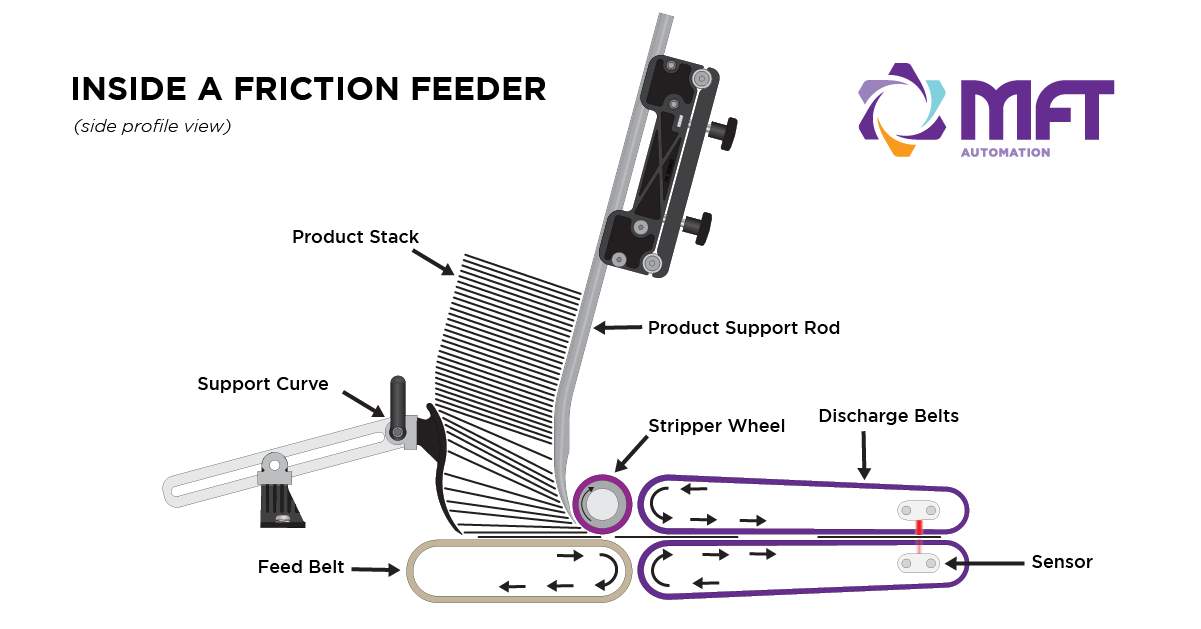
After the feed belts remove the product from the bottom of the stack, the product enters the friction feeder’s discharge. The discharge belts travel faster than the feed belts, which separate the products. Gaps between products are essential for accurate counting. The discharge dispenses the products either onto a conveyor or into a catch tray for batching.
Where are friction feeders used?
As a piece of automation equipment, friction feeders are often used in larger automation systems, though they can stand independently. Friction feeders can be found in several different industries including, packaging, printing, food, medical, and more. Examples of friction-feeding applications include tipping, batching, counting, inserting, collating, and more.
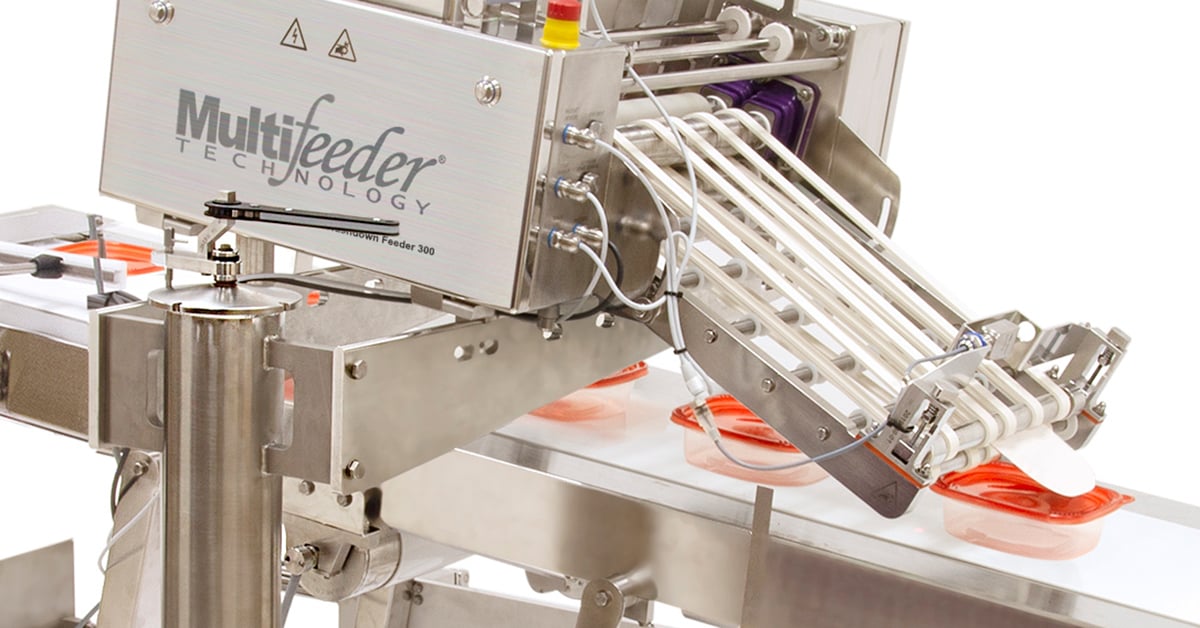
Will it feed my product?
Friction feeders are very flexible pieces of equipment. The most important thing is that the product is flat and mildly rigid but there are several factors that may affect the product's ability to feed. If the product is too flimsy, the product will bunch up during the separation process and cause jams and delays. Flimsy products also wrinkle and curl which makes them harder to feed as the bent parts get caught in the machinery. The texture of the product is another large factor that affects if a product is feedable. A problem with the texture that arises when moving two pouches together is static electricity. Static electricity can make it hard for the products to separate from each other, causing delays in the automation process.
The best way to know if your product will feed is to test the product. At MFT Automation, we understand the need to test before you invest. If you send us a sample of your product we will send you a free video demo of your product being run through our equipment.
Why invest in a friction feeder?
Automation has a high return on investment. Time is money and companies save a lot of time when they invest in automation. Workers can focus on more complex tasks while the friction feeder takes care of tedious and monotonous tasks. These complex tasks are a more efficient use of wages when automation is an option. Product quality is also increased as friction feeders are more accurate and precise with placements and counting. Friction feeders are highly versatile in size, material, and maximum speeds to fit into any production environment and can easily be integrated into existing production lines or stand independently
What are the Friction Feeder options that MFT Automation offers?
MFT Automation has a diverse selection of high-performance friction feeders, ranging in sizes, maximum speeds, sanitary requirements, and more. MFT Automation has three friction feeder families:
Signature (v3) Series
Our robust and cost-effective feeding solution. The MFT Automation v3 series, the Signature Series, (v3) is our economical, cost-effective friction feeder machine. Designed and built with the same quality as our premium feeders, the Signature Series v3 is engineered for lower throughput and speed applications. A powerful 500-watt, two-thirds horsepower brushless servo motor, computer controls, and four different discharge lengths make the Signature Series friction feeder a top contender in its class. The Signature Series feeders are a strong, robust, and reliable lower-demand machine for simpler applications providing dependability on the production floor.
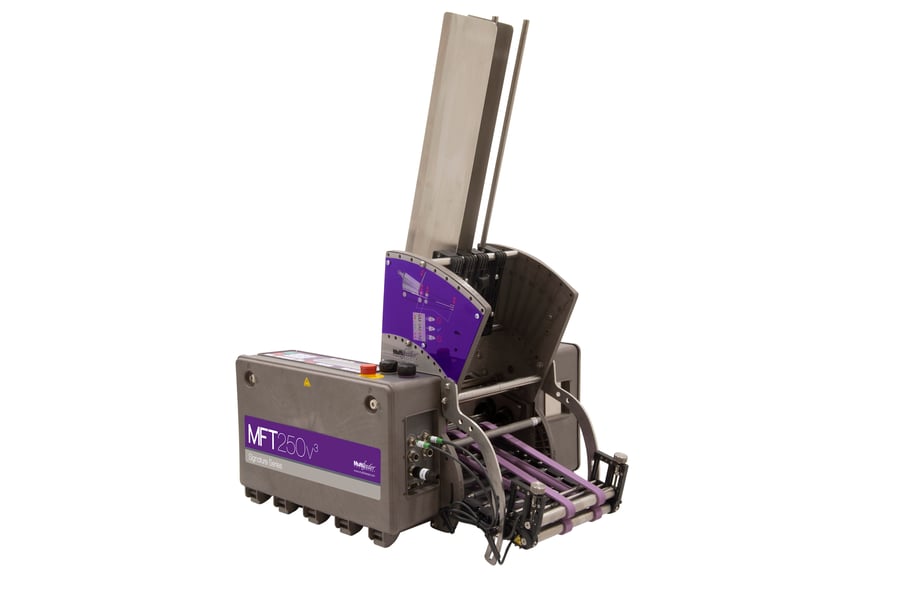
Industrial Performance (ip3) Series
Our classic premium feeding solution. The MFT Automation ip3 series, Industrial Performance (ip) provides superior high performance and quality in a friction feeder machine. Standard features of the ip3 friction feeders include batch count software and double detection. All ip3 feeders have self-contained computer/microprocessor controllers providing ease of use and versatility in product feeding. An infrared sensor comes with all feeders for product overlap, but the proprietary “Double Detect Sensor” for true double detection and guarantee correct count is only available on the ip3, and HCP. Designed with a powerful 750 watt single horsepower (optional 1000 watt available) brushless servo motor, computer controller, five different discharge lengths available, plus flexible and open discharge options, makes our friction feeders an industry leader. All of this makes our friction feeders extremely strong and robust for the most demanding applications, with the reliability to provide years of uninterrupted service.
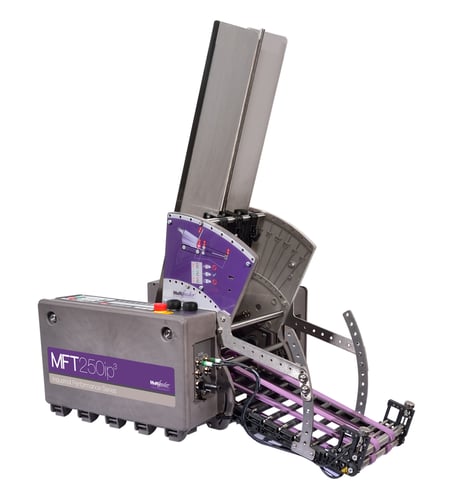
High Continous Performance (HCP) Series
Next level feeding solution. The MFT Automation High Continuous Performance Series (HCP) expands on the performance and accuracy already built into the MFT Automation Industrial Performance Series Friction Feeders. It unifies high-performance parts with specially tuned software. This high continuous performance feeding machine will allow you to take your production to the next level of productivity. High linear speeds and tighter placement equate to more product throughput. Contact one of our application engineers to find out how we can help you increase your productivity with an HCP Friction Feeder Machine.
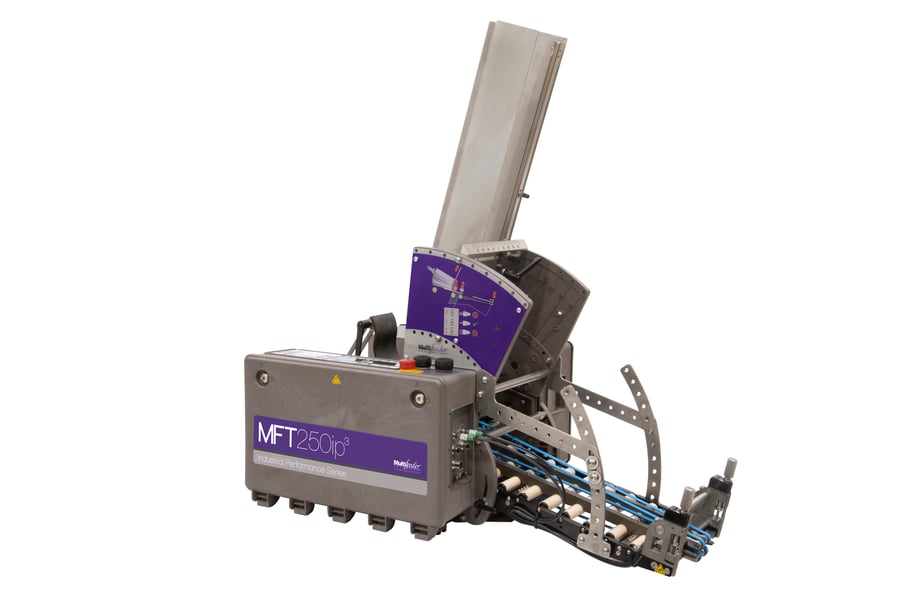
Hygienic Washdown Series
Clean in Place feeding solution with minimal risk of contamination. The Hygienic Washdown Series meets sanitary requirements and complies with IP66 or higher as well as NEMA4X standards. The hygienic friction feeder is designed for end customers in the food, medical, and pharmaceutical industry that need to repetitively and aggressively clean their production floor equipment. This clean-in-place (CIP) friction feeder is engineered with type 304 stainless steel, powered by a 1200-watt brushless servo motor, is moisture and corrosion resistant and meets FDA standards. The open design allows for minimal disassembly for easy cleaning and maintenance. This machine is self-draining and has compatible materials with no hollow areas, which is a principle we follow to ensure a sanitary design and reduced risk of contamination.
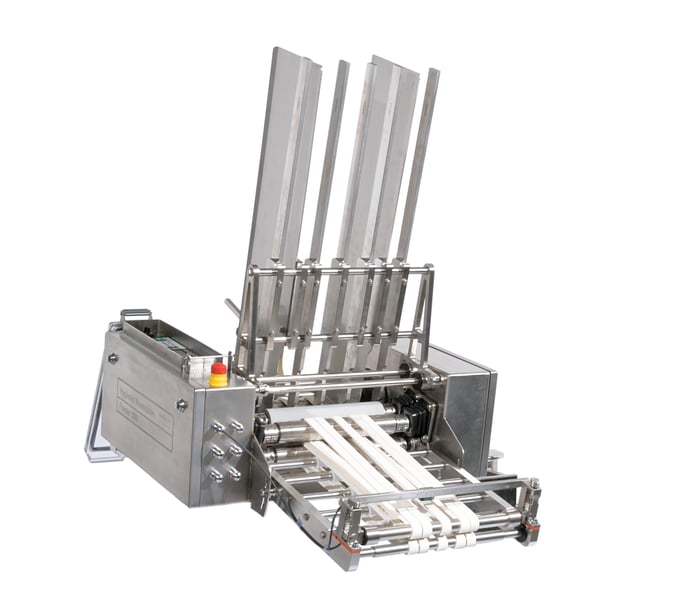
MFT Automation: Your Friction Feeder and Automation Expert
MFT Automation has been helping customers design, build, and integrate friction feeders and automation solutions for over 25 years. MFT Automation’s equipment, systems, and services are known for their flexibility, accuracy, and performance, made possible by our engineering-oriented and customer-driven approach. With an abundance of in-house resources including Mechanical Engineering, Electrical Engineering, Software Engineering, and a machine shop with modern CNC and lathe machine tools, we work with customers from the first solution draft to installation and integration. Contact us with your latest automation challenge, online or give us a call at 1-651-427-1255.



